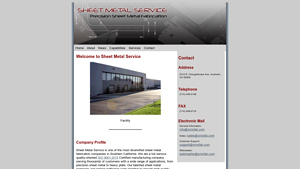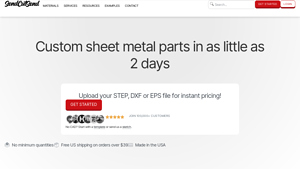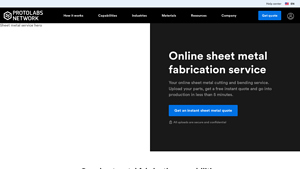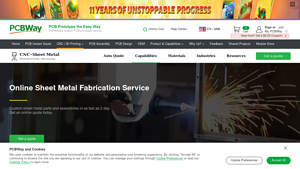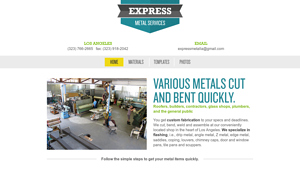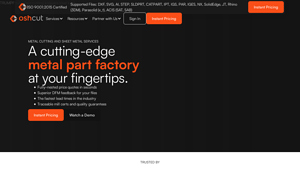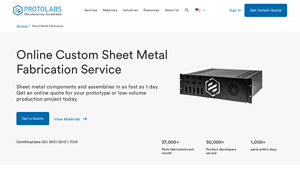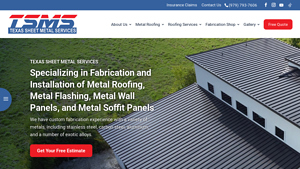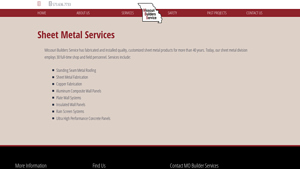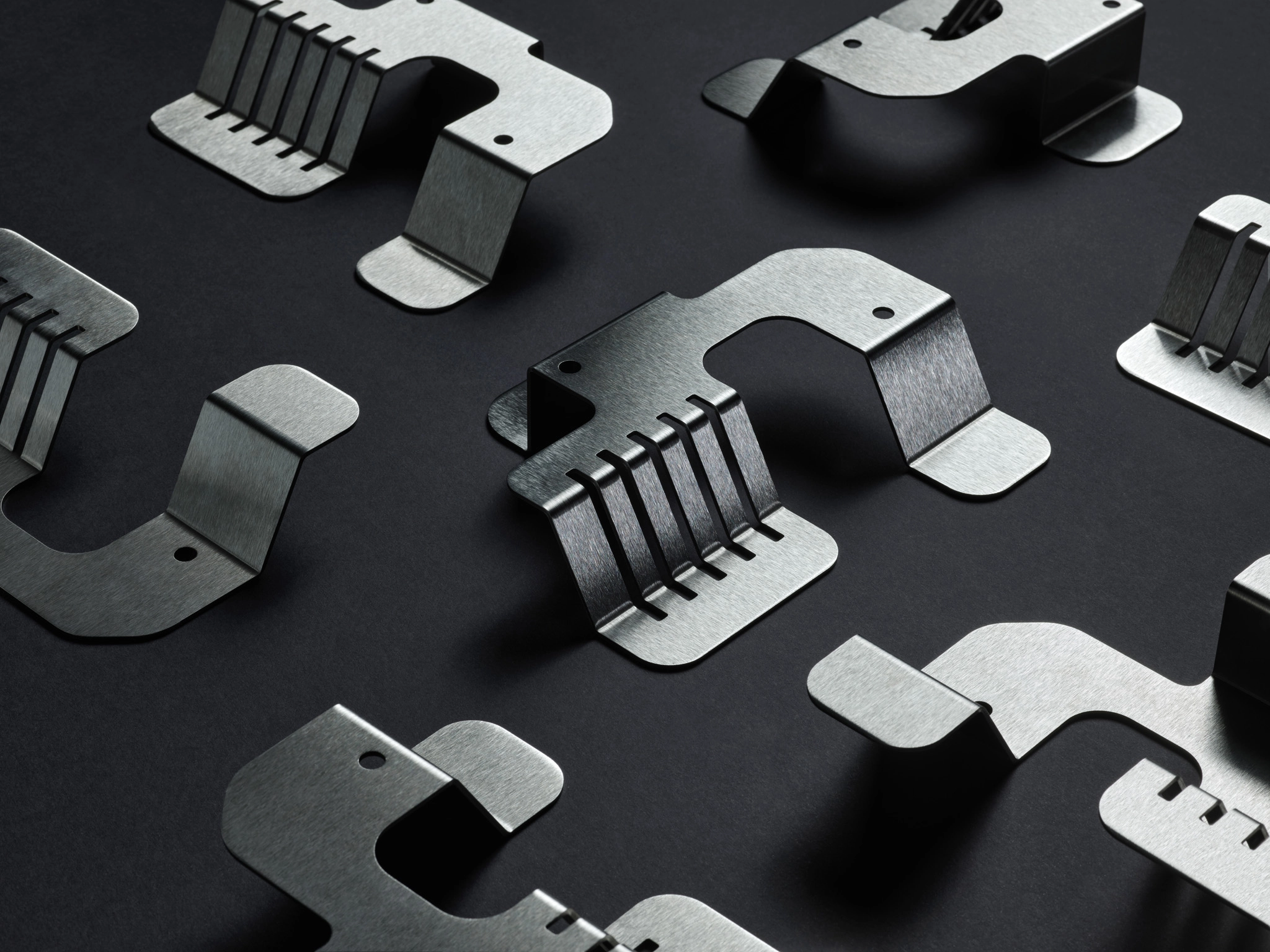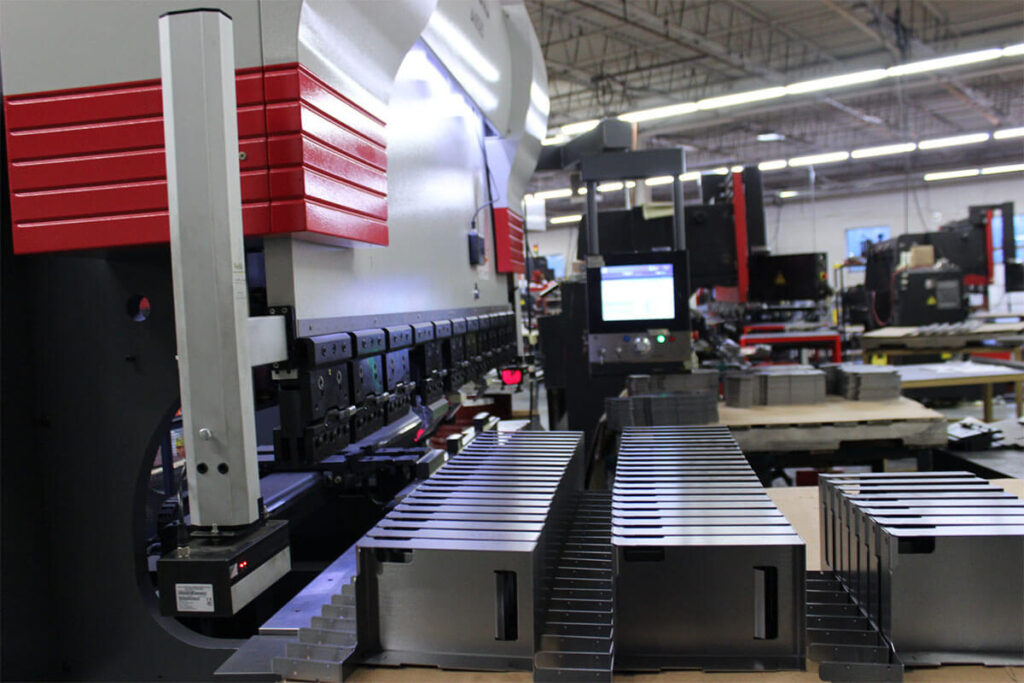Top 9 Sheet Metal Services Manufacturers & Suppliers List
1. Smsfab – Sheet Metal Fabrication Solutions
Domain: smsfab.com
Registered: 2009 (16 years)
Introduction: Sheet Metal Service is a diversified sheet metal fabrication company in Southern California, offering full-service, quality-oriented manufacturing. They are ISO 9001:2015 Certified and serve a wide range of applications from precision sheet metal to heavy plate. The company stocks industry standard sizes and grades of steel, stainless steel, and aluminum, and provides high-quality custom metal pro…
2. SendCutSend – Custom Sheet Metal Fabrication
Domain: sendcutsend.com
Registered: 2015 (10 years)
Introduction: SendCutSend offers custom sheet metal fabrication services including laser cutting, CNC routing, waterjet cutting, anodizing, bending & forming, countersinking, dimple forming, hardware insertion, plating, powder coating, tapping, tumbling, and deburring. They provide instant pricing for custom sheet metal parts, with a turnaround time of as little as 2-4 days for standard orders. Customers can up…
3. Hubs – Online Sheet Metal Fabrication
Domain: hubs.com
Registered: 1998 (27 years)
Introduction: Online sheet metal fabrication service with instant quotes. Capabilities include laser cutting (1-6mm thickness) and bending (1-6mm thickness). Standard materials available: Aluminum 5052, 5754; Stainless steel 304, 316L; Mild steel 1018; Copper C110. Tolerances: Cutting feature ± .00787” (0.2mm), Bend angle ± 1.0°, Bend to edge ± 0.010” (0.254mm). Available surface finishes include Standard, Be…
4. PCBWay – Custom Sheet Metal Fabrication
Domain: pcbway.com
Registered: 2012 (13 years)
Introduction: Sheet Metal Fabrication Service offers custom sheet metal parts and assemblies with a quick turnaround of as fast as 2 days. The service includes an easy-to-use online quoting system and ensures on-time shipment for orders ranging from single parts to 500 parts. The fabrication process involves bending, stretching, and material removal using press brake punches and die tooling. Typical products ma…
5. Express Metal Services – Custom Metal Fabrication
Domain: expressmetalservices.com
Registered: 2010 (15 years)
Introduction: Custom metal fabrication services including flashing (drip metal, angle metal, Z metal, edge metal, saddles, coping, louvers, chimney caps, door and window pans, tile pans, scuppers). Services include cutting, bending, welding, and assembling. Customers can choose materials and thickness from stock and submit specifications via templates.
6. Oshcut – Laser Cutting & Sheet Metal Services
Domain: oshcut.com
Registered: 2018 (7 years)
Introduction: Laser Cutting and Sheet Metal Services, 2-day delivery throughout the US, Online DFM/Ordering, Laser Metal Cutting, Laser Tube Cutting, Flat Finishing, Bending, Metal Tapping, Bead Blasting, Centrifugal Tumbling, Powder Coating, ISO 9001:2015 Certified, Supported Files: DXF, SVG, AI, STEP, SLDPRT, CATPART, IPT, IGS, PAR, IGES, NX, SolidEdge, JT, Rhino (3DM), Parasolid (x_t), ACIS (SAT, SAB), Insta…
7. Proto Labs – Sheet Metal Fabrication Service
Domain: protolabs.com
Registered: 2006 (19 years)
Introduction: Sheet Metal Fabrication Service offers online quotes for custom sheet metal components and assemblies with a lead time as fast as 1 day. Key capabilities include laser cutting, forming and bending, punching, and fabricated assemblies. The service provides 3D visualized Design for Manufacturability (DFM) feedback, allowing for cost management and actionable design insights. The fabrication capabili…
8. Texas Sheet Metal Services – Metal Roofing Solutions
Domain: texassheetmetalservices.com
Registered: 2021 (4 years)
Introduction: Metal Roofing Services: Residential Metal Roofing, Commercial Metal Roofing, Standing Seam, Corrugated Metal Roofing, Metal Shake Roofing, Decra Metal Roofing. Roofing Services: Metal Roof Repair & Maintenance, Metal Roof Installation & Replacement, Storm & Hail Damage, Elastomeric Coating. Custom Fabrication Services: Welding, Laser Cutting, Brush Finishing, Powder Coatings. Metal Components: Chi…
9. Missouri Builders – Customized Sheet Metal Solutions
Domain: missouribuilders.net
Registered: 2004 (21 years)
Introduction: Missouri Builders Service offers customized sheet metal products and services, including: Standing Seam Metal Roofing, Sheet Metal Fabrication, Copper Fabrication, Aluminum Composite Wall Panels, Plate Wall Systems, Insulated Wall Panels, Rain Screen Systems, and Ultra High Performance Concrete Panels. The company has over 40 years of experience and employs 30 full-time personnel in their sheet me…
Introduction: Navigating the Global Market for sheet metal services
In today’s interconnected global economy, sourcing reliable sheet metal services can be a daunting challenge for B2B buyers. Factors such as varying standards, material availability, and the intricacies of international shipping add layers of complexity to the procurement process. This guide serves as a comprehensive resource, addressing critical aspects of sheet metal services, including types of fabrication techniques, common applications across industries, and strategic supplier vetting processes. By exploring cost structures and quality certifications, international buyers—particularly from regions like Africa, South America, the Middle East, and Europe—can navigate the market with confidence.
The goal of this guide is to empower B2B buyers with the knowledge needed to make informed purchasing decisions. Whether you are in Brazil seeking precision components for automotive manufacturing or in Germany looking for customized enclosures for electronics, this resource is tailored to meet your needs. We delve into the nuances of material selection, offer insights on lead times, and highlight best practices for ensuring quality and compliance in your supply chain. With actionable insights and expert recommendations, this guide aims to streamline your sourcing journey and enhance your competitive advantage in the global market for sheet metal services.
Understanding sheet metal services Types and Variations
| Type Name | Key Distinguishing Features | Primary B2B Applications | Brief Pros & Cons for Buyers |
|---|---|---|---|
| Laser Cutting | High precision; fast processing; minimal waste | Automotive, Aerospace, Electronics | Pros: Quick turnaround; intricate designs possible. Cons: Higher initial setup costs. |
| CNC Machining | Computer-controlled for high accuracy; versatile | Custom parts, prototypes, large runs | Pros: Consistent quality; scalable production. Cons: Longer lead times for complex parts. |
| Metal Bending | Forming metal sheets into specific angles and shapes | HVAC, Construction, Furniture | Pros: Customizable; strong structural integrity. Cons: Requires skilled labor; potential for material wastage. |
| Welding Services | Joining metal parts through heat and/or pressure | Heavy equipment, Structural applications | Pros: Strong joints; suitable for large assemblies. Cons: Time-consuming; may require post-weld finishing. |
| Surface Finishing | Enhances aesthetic and functional properties | Consumer goods, Electronics | Pros: Improves durability and appearance. Cons: Additional costs and processing time. |
What Are the Characteristics of Laser Cutting Services?
Laser cutting is recognized for its high precision and rapid processing capabilities. This service utilizes focused laser beams to cut through various materials, leading to minimal waste and the ability to execute intricate designs. It is particularly suitable for industries such as automotive and aerospace, where precision is critical. B2B buyers should consider the initial setup costs, which can be higher, but the quick turnaround time and design flexibility often justify the investment.
Why Choose CNC Machining for Sheet Metal Fabrication?
CNC machining employs computer-controlled tools to achieve high accuracy in cutting and shaping metal sheets. This method is versatile and can handle a variety of materials and thicknesses, making it ideal for custom parts and prototypes. Industries like electronics and automotive benefit significantly from CNC machining due to its ability to produce complex geometries consistently. Buyers should weigh the advantages of consistent quality and scalability against potentially longer lead times for more intricate designs.
How Does Metal Bending Serve B2B Needs?
Metal bending is a critical service that involves forming metal sheets into specific angles and shapes using various techniques. This service is essential in sectors such as HVAC and construction, where precision bends are required for ductwork or structural components. While bending offers a high level of customization and results in strong structural integrity, buyers must consider the skill level required for operation and the potential for material wastage during the bending process.
What Are the Benefits of Welding Services in Metal Fabrication?
Welding services join metal parts through heat and/or pressure, creating strong and durable joints. This method is commonly used in heavy equipment manufacturing and structural applications, where strength is paramount. While welding is effective for large assemblies, buyers should be aware that the process can be time-consuming and may necessitate additional finishing steps to ensure a clean appearance and structural integrity.
How Important is Surface Finishing in Sheet Metal Services?
Surface finishing involves enhancing the aesthetic and functional properties of metal parts through various techniques, such as anodizing, plating, or powder coating. This service is crucial for industries that prioritize both durability and appearance, such as consumer goods and electronics. While surface finishing improves product longevity and visual appeal, buyers should consider the added costs and processing time that come with these enhancements.
Key Industrial Applications of sheet metal services
| Industry/Sector | Specific Application of sheet metal services | Value/Benefit for the Business | Key Sourcing Considerations for this Application |
|---|---|---|---|
| Automotive | Custom chassis and enclosures | Enhances vehicle durability and performance | Material specifications, compliance with safety standards |
| Construction | Structural components and metal flashing | Provides weather resistance and structural integrity | Availability of standard sizes, lead times, and local regulations |
| Aerospace | Precision parts for aircraft components | Ensures lightweight and high-strength solutions | Certification requirements, tolerances, and material traceability |
| Electronics | Custom enclosures for electronic devices | Protects sensitive components from environmental damage | Design specifications, thermal management needs, and EMI shielding |
| HVAC | Ductwork and ventilation systems | Improves energy efficiency and air quality | Material selection, insulation requirements, and installation support |
How Are Sheet Metal Services Used in the Automotive Industry?
In the automotive sector, sheet metal services are crucial for producing custom chassis and enclosures that enhance vehicle durability and performance. These components must withstand harsh conditions while maintaining structural integrity. International buyers, especially from emerging markets, should prioritize suppliers with expertise in local regulations and standards to ensure compliance with safety norms. Additionally, sourcing partners should be able to provide a variety of materials, including lightweight alloys, to meet specific performance requirements.
What Role Does Sheet Metal Fabrication Play in Construction?
In construction, sheet metal services are utilized for fabricating structural components and metal flashing, which protect buildings from water intrusion and weather-related damage. These components are essential for ensuring the structural integrity and longevity of buildings. Buyers in regions like Africa and South America should consider sourcing from companies that offer a range of standard sizes and materials, as well as quick turnaround times to meet project deadlines. Understanding local building codes is also critical for compliance.
How is Sheet Metal Fabrication Essential in Aerospace Applications?
The aerospace industry relies on sheet metal services for precision parts used in aircraft components, such as fuselages and wings. The need for lightweight yet strong materials is paramount, and these parts must meet stringent safety and performance standards. Buyers should focus on suppliers who are ISO certified and can guarantee high tolerances and material traceability. Additionally, understanding the specific certification requirements for aerospace components is essential for international sourcing.
Why Are Sheet Metal Services Important for Electronics Manufacturing?
In electronics, sheet metal services are vital for creating custom enclosures that protect sensitive components from environmental hazards. These enclosures must provide adequate thermal management and electromagnetic interference (EMI) shielding. B2B buyers should seek suppliers who can meet specific design requirements and offer various finishing options to enhance durability. Additionally, understanding the local market’s demand for electronic devices can help in selecting the right sourcing partners.
How Do Sheet Metal Services Improve HVAC Systems?
Sheet metal services are integral to the production of ductwork and ventilation systems in HVAC applications. These components play a significant role in improving energy efficiency and indoor air quality in commercial and residential buildings. Buyers should consider sourcing from manufacturers that provide a variety of materials and insulation options to meet specific energy standards. Quick lead times and support for installation can also enhance the overall value of the sourcing relationship.
3 Common User Pain Points for ‘sheet metal services’ & Their Solutions
Scenario 1: Delays in Production Due to Material Availability
The Problem: B2B buyers often face significant challenges when sourcing materials for sheet metal fabrication. One common issue is unexpected delays caused by a lack of available materials. This can occur due to supply chain disruptions, which have become more frequent in recent years. When critical materials such as stainless steel or aluminum are unavailable, production timelines can extend, leading to missed deadlines and increased costs. For companies that rely on timely delivery to maintain their own production schedules, these delays can be detrimental.
The Solution: To mitigate the risk of material shortages, B2B buyers should establish strong relationships with multiple suppliers and conduct thorough market research to understand current trends in material availability. Buyers can proactively inquire about stock levels and lead times for critical materials before placing orders. Additionally, implementing a Just-In-Time (JIT) inventory strategy can help ensure that materials arrive exactly when needed, reducing the risk of holding excess inventory. Regular communication with suppliers about market fluctuations and potential disruptions can also help buyers stay ahead of challenges. Finally, consider investing in a diversified supplier network across different regions to ensure a consistent supply, especially when sourcing from areas prone to geopolitical or economic instability.
Scenario 2: Quality Assurance Issues in Custom Fabrication
The Problem: Quality control is a significant concern for B2B buyers of sheet metal services, particularly when dealing with custom fabrication. If the specifications are not met, the resulting products can fail to perform as required, leading to costly rework and potential damage to the buyer’s reputation. Issues can arise from miscommunication regarding specifications, inadequate quality control processes, or a lack of understanding of the materials being used. These challenges are especially pronounced for international buyers who may face language barriers and different standards of quality.
The Solution: To ensure high-quality outcomes, buyers should implement a clear and detailed specification process that includes drawings, tolerances, and material requirements. Utilizing 3D modeling software can help convey complex designs more effectively. Before committing to a supplier, buyers should thoroughly vet their quality control processes, including certifications such as ISO 9001:2015, which indicates a commitment to quality management. Additionally, establishing a protocol for regular quality checks during production can help catch issues early. Buyers should also consider arranging for on-site inspections or third-party quality audits, especially for high-stakes projects. This proactive approach can help ensure that the final products meet the necessary standards and specifications.
Scenario 3: Navigating Complex Pricing Structures
The Problem: Many B2B buyers find themselves confused by the complex pricing structures associated with sheet metal services. Factors such as material type, thickness, cutting methods, and finishing processes can all influence the final cost, making it difficult for buyers to budget accurately. This complexity can lead to unexpected expenses, strained supplier relationships, and challenges in price negotiations. Buyers from regions with fluctuating currency values may also face additional challenges when trying to predict costs accurately.
The Solution: To navigate pricing complexities, buyers should engage in thorough upfront discussions with potential suppliers to understand their pricing models. Requesting detailed quotes that break down costs by material, labor, and processing can provide clarity. Additionally, buyers should explore online platforms that offer instant pricing calculators, allowing them to input specifications and receive immediate cost estimates. When negotiating with suppliers, being transparent about budget constraints and desired outcomes can foster collaborative discussions. Buyers should also consider establishing long-term contracts with suppliers to lock in favorable rates and reduce variability in pricing. This approach can help create a more predictable budgeting environment, enabling companies to plan their projects more effectively.
Strategic Material Selection Guide for sheet metal services
What Are the Key Properties of Common Materials Used in Sheet Metal Services?
When selecting materials for sheet metal services, understanding the properties of each option is crucial for optimizing product performance. Here, we analyze four common materials: carbon steel, stainless steel, aluminum, and copper, focusing on their characteristics, advantages, disadvantages, and implications for international buyers.
How Does Carbon Steel Perform in Sheet Metal Applications?
Key Properties: Carbon steel is known for its high strength and durability, with excellent machinability. It typically offers good performance under high pressure and temperature conditions but is prone to corrosion if not properly treated.
Pros & Cons: The primary advantage of carbon steel is its cost-effectiveness and strength, making it suitable for structural applications. However, its susceptibility to rust necessitates protective coatings, which can increase manufacturing complexity and cost.
Impact on Application: Carbon steel is compatible with a wide range of applications, including automotive and construction. Its performance can be affected by exposure to moisture, making it less suitable for environments with high humidity unless adequately protected.
Considerations for International Buyers: Compliance with ASTM standards is common, but buyers must also consider local regulations regarding corrosion resistance and environmental impact. In regions like Europe and South America, adherence to specific environmental standards may influence material selection.
What Advantages Does Stainless Steel Offer for Sheet Metal Services?
Key Properties: Stainless steel is renowned for its corrosion resistance, durability, and ability to withstand high temperatures. It maintains its strength and integrity even in harsh environments.
Pros & Cons: The key advantage of stainless steel is its longevity and low maintenance requirements, making it ideal for applications in food processing, medical devices, and outdoor structures. However, it is more expensive than carbon steel and can be more challenging to fabricate due to its toughness.
Impact on Application: Stainless steel is particularly suitable for applications requiring hygiene and cleanliness, such as in the food and pharmaceutical industries. Its corrosion resistance makes it a preferred choice in coastal areas.
Considerations for International Buyers: Buyers should ensure compliance with international standards like ASTM and DIN, especially in industries where hygiene is critical. The cost implications of using stainless steel may also vary significantly based on local market conditions.
How Does Aluminum Compare as a Material for Sheet Metal Fabrication?
Key Properties: Aluminum is lightweight, corrosion-resistant, and has excellent thermal and electrical conductivity. It is relatively soft compared to steel, which can affect its strength in certain applications.
Pros & Cons: The main advantage of aluminum is its low weight, making it ideal for applications in aerospace and automotive industries where weight reduction is crucial. However, its lower strength compared to steel can limit its use in high-stress applications.
Impact on Application: Aluminum is often used in applications requiring lightweight materials without compromising on strength, such as in transportation and packaging. Its corrosion resistance makes it suitable for outdoor use.
Considerations for International Buyers: Compliance with JIS standards may be particularly relevant in Asia, while European buyers should consider EN standards. The cost of aluminum can fluctuate based on global market trends, impacting budget considerations.
What Role Does Copper Play in Sheet Metal Services?
Key Properties: Copper is highly conductive, making it ideal for electrical applications. It also offers excellent corrosion resistance and antimicrobial properties.
Pros & Cons: The key advantage of copper is its superior electrical and thermal conductivity, making it essential for electrical components. However, it is more expensive than other metals and can be prone to tarnishing and corrosion if not properly treated.
Impact on Application: Copper is primarily used in electrical applications, plumbing, and roofing. Its antimicrobial properties also make it suitable for environments requiring hygiene, such as hospitals.
Considerations for International Buyers: Buyers should be aware of the specific regulations regarding copper usage in plumbing and electrical systems, particularly in regions with stringent building codes. Compliance with ASTM standards is also essential.
Summary Table of Material Selection for Sheet Metal Services
| Material | Typical Use Case for sheet metal services | Key Advantage | Key Disadvantage/Limitation | Relative Cost (Low/Med/High) |
|---|---|---|---|---|
| Carbon Steel | Structural components in construction | Cost-effective and strong | Prone to corrosion | Low |
| Stainless Steel | Food processing equipment | Corrosion resistant and durable | Higher cost and fabrication complexity | High |
| Aluminum | Aerospace and automotive parts | Lightweight and corrosion resistant | Lower strength than steel | Medium |
| Copper | Electrical components and plumbing | Excellent conductivity | High cost and tarnishing risk | High |
This strategic material selection guide provides essential insights for international B2B buyers, enabling informed decisions based on material properties, application suitability, and compliance considerations.
In-depth Look: Manufacturing Processes and Quality Assurance for sheet metal services
What Are the Key Stages in the Manufacturing Process for Sheet Metal Services?
The manufacturing process for sheet metal services typically comprises several critical stages: material preparation, forming, assembly, and finishing. Understanding these stages is essential for B2B buyers looking for reliable suppliers.
How Is Material Prepared for Sheet Metal Fabrication?
Material preparation is the foundational step in the sheet metal fabrication process. It involves selecting appropriate materials based on the project requirements, which may include various grades of steel, aluminum, or specialized alloys.
Once the material is selected, it is cut into manageable sizes using techniques such as shearing or laser cutting. This initial stage often includes the inspection of the raw materials to ensure they meet specifications, which can involve checking for surface defects or thickness variations.
What Forming Techniques Are Commonly Used in Sheet Metal Services?
The forming stage is where the actual shaping of the metal occurs. Common techniques include bending, stamping, and deep drawing.
- Bending is frequently employed to create angles and curves, using press brakes or roll formers.
- Stamping involves using dies to cut or shape the metal, often utilized for producing complex shapes or high-volume parts.
- Deep drawing is a method for creating hollow parts, such as enclosures or containers, by pulling the sheet metal into a die.
Precision is critical during this phase, as tolerances can significantly impact the functionality of the final product.
How Does the Assembly Process Work in Sheet Metal Fabrication?
The assembly stage includes welding, riveting, or fastening components together to form the final product. This step can also involve additional processes like hardware insertion or the application of seals and gaskets to enhance product integrity.
Effective assembly requires skilled technicians who can ensure that all components fit together seamlessly, maintaining the quality standards expected by B2B clients.
What Finishing Options Are Available for Sheet Metal Products?
Finishing is the final stage in the manufacturing process and plays a vital role in enhancing the product’s durability and aesthetic appeal. Various finishing techniques can be applied, including:
- Powder Coating: Provides a durable, protective layer and comes in various colors.
- Anodizing: Particularly for aluminum, this process enhances corrosion resistance while allowing for color options.
- Plating: Commonly used for steel products, it adds a layer of protection against rust and wear.
Each finishing method not only contributes to the product’s appearance but also influences its performance in different environments.
What Quality Assurance Measures Are Essential for Sheet Metal Services?
Quality assurance (QA) is paramount in the sheet metal fabrication process, ensuring that products meet specified standards and regulations.
Which International Standards Should B2B Buyers Consider?
For international B2B transactions, compliance with recognized standards is crucial. The ISO 9001:2015 certification is a widely accepted quality management standard that indicates a company’s commitment to quality processes. Additionally, industry-specific certifications such as CE marking for products sold in Europe or API standards for oil and gas applications may also be necessary.
What Are the Key Quality Control Checkpoints in the Manufacturing Process?
Quality control (QC) checkpoints are integral to maintaining standards throughout the manufacturing process. Typical checkpoints include:
- Incoming Quality Control (IQC): Inspection of raw materials upon arrival to ensure compliance with specifications.
- In-Process Quality Control (IPQC): Regular checks during the manufacturing process to catch defects early.
- Final Quality Control (FQC): Comprehensive testing of the finished product to verify it meets all requirements.
Common testing methods include dimensional checks, material property tests, and visual inspections to detect surface imperfections.
How Can B2B Buyers Verify Supplier Quality Control Practices?
B2B buyers can take several steps to verify the QC practices of potential suppliers:
-
Audits: Conducting on-site audits allows buyers to assess the supplier’s processes, equipment, and compliance with quality standards.
-
Quality Reports: Requesting documentation on past quality control metrics, including defect rates and corrective actions taken, can provide insight into the supplier’s reliability.
-
Third-Party Inspections: Engaging independent inspectors to evaluate the manufacturing process can offer an unbiased view of the supplier’s adherence to quality standards.
What Are the Nuances of Quality Control for International B2B Buyers?
For international buyers, understanding the nuances of QC is essential. Different regions may have varying standards and expectations regarding quality. For example, European clients may prioritize CE certification, while buyers from the Middle East might focus on ISO certifications.
Moreover, language barriers and differing regulatory environments can complicate communication. Therefore, it is crucial for buyers to establish clear lines of communication with suppliers and ensure that all quality expectations are explicitly defined and agreed upon before commencing production.
Conclusion
Understanding the manufacturing processes and quality assurance measures in sheet metal services is vital for B2B buyers looking to source reliable suppliers. By comprehending each stage—from material preparation to finishing—and recognizing the importance of quality control, buyers can make informed decisions and build long-lasting relationships with their suppliers.
Practical Sourcing Guide: A Step-by-Step Checklist for ‘sheet metal services’
In today’s competitive market, sourcing sheet metal services requires a strategic approach to ensure quality and cost-effectiveness. This guide provides a practical checklist for B2B buyers to navigate the procurement process effectively, focusing on essential steps that will lead to successful partnerships with suppliers.
Step 1: Define Your Technical Specifications
Before initiating contact with suppliers, it’s essential to clearly define your technical requirements. This includes specifications such as material types (e.g., stainless steel, aluminum), dimensions, thicknesses, and finish options. A well-documented specification not only streamlines the quoting process but also minimizes misunderstandings later in production.
Step 2: Research and Shortlist Potential Suppliers
Conduct thorough research to identify potential suppliers that specialize in sheet metal services. Look for companies with a proven track record in your industry, and consider factors such as geographic location, production capabilities, and customer reviews. Building a shortlist of reliable suppliers will facilitate better comparisons and informed decisions.
Step 3: Evaluate Supplier Certifications
Certifications can be a strong indicator of a supplier’s quality and reliability. Verify that the suppliers hold relevant certifications, such as ISO 9001:2015, which demonstrates adherence to international quality management standards. Additionally, check for industry-specific certifications that may be required for your sector, ensuring that the supplier meets all necessary compliance standards.
Step 4: Request Detailed Quotes
Once you have shortlisted suppliers, request detailed quotes based on your defined specifications. A comprehensive quote should include pricing, lead times, and any additional costs for services such as finishing or assembly. Pay attention to the breakdown of costs, as this will help you understand where you might find flexibility for negotiation or adjustments.
Step 5: Assess Production Capabilities and Lead Times
Understanding a supplier’s production capabilities and lead times is crucial for meeting your project deadlines. Ask about their manufacturing processes, capacity, and typical turnaround times for both prototypes and bulk orders. This information will help you gauge whether they can meet your specific demands and timelines.
Step 6: Verify Quality Control Processes
Quality control is a vital component of sheet metal fabrication. Inquire about the supplier’s quality assurance processes, including inspection methods and testing protocols. Suppliers should have clear procedures in place to ensure that all products meet your specifications and industry standards.
Step 7: Establish Communication and Support Channels
Effective communication is key to a successful supplier relationship. Ensure that the supplier has dedicated support channels for inquiries, updates, and problem resolution. Establishing a clear line of communication from the outset will facilitate smoother project management and foster a collaborative partnership.
By following this checklist, B2B buyers can systematically approach the procurement of sheet metal services, ensuring they partner with suppliers who can deliver quality products tailored to their specific needs.
Comprehensive Cost and Pricing Analysis for sheet metal services Sourcing
What Are the Key Cost Components in Sheet Metal Services?
Understanding the cost structure in sheet metal services is crucial for international B2B buyers. The primary cost components include materials, labor, manufacturing overhead, tooling, quality control (QC), logistics, and profit margin.
-
Materials: The choice of material significantly influences pricing. Common materials include various grades of steel, aluminum, and specialty metals. Prices can vary widely based on market demand, availability, and specific material properties required for the application.
-
Labor: Skilled labor is essential for high-quality fabrication. Labor costs can differ based on the region and the complexity of the work. Automation may reduce labor costs but can increase initial setup expenses.
-
Manufacturing Overhead: This includes costs associated with the operation of machinery, utilities, and facility maintenance. Overhead can be a significant factor, particularly for smaller manufacturers without economies of scale.
-
Tooling: Custom tooling is often necessary for specialized components. The costs associated with designing and producing tooling can be substantial, especially for low-volume orders.
-
Quality Control: Ensuring that products meet specific standards requires investment in quality control processes. Certifications such as ISO 9001 can add to the cost but provide assurance of quality.
-
Logistics: Transportation costs must be considered, particularly for international shipping. Factors such as distance, shipping method, and customs duties can impact the overall cost.
-
Margin: Suppliers will include a profit margin in their pricing, which can vary based on their market position and competitive landscape.
How Do Price Influencers Affect Sheet Metal Service Costs?
Several factors can influence pricing strategies for sheet metal services, which are critical for buyers to consider:
-
Volume and Minimum Order Quantities (MOQ): Larger orders typically reduce per-unit costs due to economies of scale. Buyers should negotiate MOQs to achieve better pricing.
-
Specifications and Customization: Custom designs and specifications can increase costs due to the additional time and resources required. Simplifying designs can lead to more competitive pricing.
-
Material Choices: Different materials come with varying costs. For instance, stainless steel is generally more expensive than carbon steel. Buyers should assess the necessity of material choices against performance needs.
-
Quality and Certifications: High-quality materials and processes often lead to higher costs. Certifications can further increase expenses but are essential for specific industries, such as aerospace or medical.
-
Supplier Factors: The reputation and location of the supplier can influence pricing. Suppliers with established quality records may charge a premium but can provide added value through reliability.
-
Incoterms: Understanding Incoterms is vital for international transactions. They define the responsibilities of buyers and sellers regarding shipping, insurance, and tariffs, which can significantly impact total costs.
What Negotiation Strategies Can Help Optimize Costs for International Buyers?
For international B2B buyers, particularly from regions like Africa, South America, the Middle East, and Europe, effective negotiation can lead to substantial cost savings:
-
Leverage Total Cost of Ownership (TCO): Consider not only the upfront costs but also long-term implications such as maintenance, durability, and resale value. This comprehensive approach can justify higher initial prices for better quality.
-
Request Transparency in Pricing: Ask suppliers for a detailed breakdown of costs. This can provide insight into areas where negotiation is possible, such as reducing overhead or adjusting profit margins.
-
Engage Multiple Suppliers: Soliciting quotes from multiple suppliers can foster competition, leading to better pricing and terms. It also provides leverage when negotiating.
-
Understand Local Market Dynamics: Recognizing regional pricing trends and supplier capabilities can empower buyers to make informed decisions. Buyers from countries like Brazil and Germany should be aware of local economic conditions affecting suppliers.
-
Factor in Logistics and Tariffs: International shipping can add significant costs. Buyers should negotiate shipping terms and consider local tariffs, which can influence the total cost.
Conclusion: What Should Buyers Keep in Mind About Pricing Nuances?
It is essential for international B2B buyers to be aware of the complexities involved in pricing for sheet metal services. Prices may fluctuate based on market conditions, material costs, and supplier capabilities. By understanding these nuances and employing effective negotiation strategies, buyers can optimize their sourcing decisions and achieve cost-effective solutions.
Disclaimer: Prices are indicative and subject to change based on market conditions, supplier pricing strategies, and specific project requirements. Always verify current pricing with suppliers before making purchasing decisions.
Alternatives Analysis: Comparing sheet metal services With Other Solutions
Understanding Alternatives in Sheet Metal Services
When evaluating manufacturing solutions, it’s essential to consider various alternatives to traditional sheet metal services. Each option presents unique advantages and challenges that can significantly impact production efficiency, cost-effectiveness, and overall project outcomes. This analysis compares sheet metal services with additive manufacturing and traditional machining, providing insights tailored for B2B buyers across diverse international markets.
Comparison Table
| Comparison Aspect | Sheet Metal Services | Additive Manufacturing | Traditional Machining |
|---|---|---|---|
| Performance | High precision and durability | Excellent for complex geometries | Good precision, limited by tooling |
| Cost | Moderate, varies with complexity | Generally higher for low volumes | Cost-effective for high volumes |
| Ease of Implementation | Requires specific design inputs | Flexible design changes, less setup | Setup time can be lengthy |
| Maintenance | Low maintenance for tooling | Minimal maintenance, but dependent on equipment | Regular maintenance required |
| Best Use Case | Enclosures, brackets, and chassis | Prototyping and custom parts | High-volume production runs |
Detailed Breakdown of Alternatives
What Are the Advantages and Disadvantages of Additive Manufacturing?
Additive manufacturing, also known as 3D printing, allows for the creation of complex geometries that are often impossible with traditional methods. This technology excels in rapid prototyping, enabling quick iterations and modifications. However, the cost of materials and machines can be prohibitive, especially for low-volume production runs. Additionally, while it offers design flexibility, the speed of production may be slower compared to sheet metal services when dealing with bulk orders.
How Does Traditional Machining Compare to Sheet Metal Services?
Traditional machining involves processes such as milling and turning, which can produce high-precision components. This method is often more cost-effective for large-scale production due to lower per-unit costs at high volumes. However, it may struggle with the complex shapes that sheet metal services can easily handle. Furthermore, traditional machining requires significant setup time and ongoing maintenance of tooling, making it less efficient for projects that demand quick turnaround times.
Conclusion: How Should B2B Buyers Choose the Right Solution?
Selecting the right manufacturing solution requires a thorough understanding of project requirements, including volume, complexity, and material specifications. For projects needing high precision and durability, sheet metal services are often the best choice. However, for highly complex designs or rapid prototyping, additive manufacturing may provide significant advantages. Conversely, for cost-sensitive, high-volume production, traditional machining could be the most economical option. By carefully assessing these factors, B2B buyers can make informed decisions that align with their operational goals and budget constraints.
Essential Technical Properties and Trade Terminology for sheet metal services
What Are the Key Technical Properties of Sheet Metal Services?
Understanding the technical properties of sheet metal is crucial for B2B buyers looking to source fabrication services. Here are some essential specifications:
-
Material Grade
Material grade refers to the classification of metals based on their chemical composition and mechanical properties. Common materials include mild steel, stainless steel, aluminum, and various alloys. Selecting the right material grade is vital for ensuring the final product meets specific performance requirements, such as strength, corrosion resistance, and weight. For example, 304 stainless steel is widely used for its excellent corrosion resistance, making it ideal for applications in harsh environments. -
Thickness
The thickness of sheet metal, typically measured in gauge or millimeters, directly affects its strength and application suitability. Thicker sheets provide greater durability and are often used in structural applications, while thinner sheets are more suitable for applications requiring flexibility or intricate designs. Understanding the thickness options available helps buyers choose the right material for their specific application needs. -
Tolerance
Tolerance refers to the permissible limits of variation in a material’s dimensions. In sheet metal fabrication, tight tolerances are critical for ensuring that parts fit together correctly, especially in assemblies. Standard tolerances can range from ±0.005 inches to ±0.010 inches, but specific projects may require tighter tolerances. Buyers must communicate their tolerance requirements clearly to avoid costly rework and delays. -
Finish
The finish of sheet metal affects its aesthetic appeal and functionality. Common finishes include anodizing, powder coating, and galvanizing. Each finish offers different benefits; for instance, anodizing enhances corrosion resistance, while powder coating provides a durable, color-rich surface. Buyers should specify desired finishes to ensure the final product meets both visual and performance standards. -
Forming and Fabrication Techniques
Various techniques, such as laser cutting, bending, and welding, are employed in sheet metal fabrication. Each method has its advantages and limitations based on the material type and desired outcome. For example, laser cutting provides precision for complex designs, while bending allows for the creation of three-dimensional shapes. Understanding these techniques enables buyers to select appropriate services that align with their design requirements.
What Are Common Trade Terms in Sheet Metal Services?
Familiarity with industry jargon can enhance communication between buyers and suppliers. Here are some common terms:
-
OEM (Original Equipment Manufacturer)
An OEM is a company that produces parts or equipment that may be marketed by another company. In the context of sheet metal services, it refers to the manufacturers who provide components that are integral to the final product. Understanding OEM relationships can help buyers identify reliable suppliers for their manufacturing needs. -
MOQ (Minimum Order Quantity)
MOQ refers to the smallest quantity of products that a supplier is willing to sell. In sheet metal services, this can affect pricing and inventory management. Buyers should consider MOQs when planning their orders to avoid excess costs or stock shortages. -
RFQ (Request for Quotation)
An RFQ is a document that solicits price quotes from suppliers for specific products or services. This is particularly relevant in sheet metal services where specifications such as material type, dimensions, and tolerances are detailed. Providing a clear RFQ helps suppliers understand requirements and deliver accurate pricing. -
Incoterms
Incoterms are international commercial terms that define the responsibilities of buyers and sellers in international trade. They clarify who is responsible for shipping, insurance, and tariffs. Familiarity with Incoterms can help buyers navigate logistical challenges and costs associated with sourcing sheet metal products from different regions. -
Lead Time
Lead time refers to the period from the placement of an order to the delivery of the product. In sheet metal services, lead times can vary based on complexity and production schedules. Buyers should be aware of lead times to plan their projects effectively and manage expectations with stakeholders.
By understanding these technical properties and trade terminology, B2B buyers can make informed decisions, ensuring they select the right sheet metal services for their specific applications.
Navigating Market Dynamics and Sourcing Trends in the sheet metal services Sector
What Are the Key Trends Shaping the Global Sheet Metal Services Market?
The sheet metal services market is currently experiencing a transformation influenced by several global drivers. The rapid growth of manufacturing sectors across regions, particularly in Africa and South America, is increasing the demand for customized and high-quality metal components. Additionally, technological advancements in automation and digital fabrication processes, such as laser cutting and CNC machining, are enhancing production efficiency and precision. B2B buyers are increasingly leveraging online platforms that offer instant pricing and rapid turnaround times, thereby streamlining their procurement processes.
Emerging trends in sourcing strategies also highlight the shift towards just-in-time (JIT) manufacturing, enabling companies to reduce inventory costs and improve cash flow. This is especially relevant for international buyers who must navigate varying lead times and logistics challenges across regions. Sustainability considerations are driving buyers to seek suppliers who can demonstrate environmentally friendly practices and materials, reflecting a growing awareness of corporate social responsibility. For instance, the adoption of eco-friendly coatings and recyclable materials is becoming a prerequisite for many procurement processes in Europe and the Middle East.
How Is Sustainability Influencing Sourcing Decisions in the Sheet Metal Sector?
The environmental impact of manufacturing processes has led to a significant shift towards sustainability and ethical sourcing within the sheet metal services sector. B2B buyers are increasingly prioritizing suppliers that adhere to green practices, such as using recycled materials and minimizing waste. This focus on sustainability is not merely a trend but a strategic imperative that aligns with global efforts to combat climate change and promote responsible consumption.
Ethical supply chains are becoming paramount, with buyers demanding transparency in sourcing practices. Certifications such as ISO 14001 for environmental management and LEED for sustainable building practices are now important criteria for many international buyers. Additionally, the use of green materials, including low-VOC paints and coatings, is gaining traction. Suppliers that can demonstrate compliance with these standards often gain a competitive advantage, as they appeal to buyers looking to enhance their own sustainability credentials.
How Has the Sheet Metal Services Industry Evolved Over Time?
The evolution of the sheet metal services industry reflects broader technological advancements and shifts in manufacturing paradigms. Originally characterized by traditional fabrication methods, the sector has embraced innovations such as computer-aided design (CAD) and automated machinery, which have dramatically improved production efficiency and product quality. The introduction of online quoting systems and digital fabrication techniques has further transformed the landscape, enabling faster turnaround times and more flexible production capabilities.
Historically, the industry catered primarily to local markets, but globalization has expanded the customer base significantly. Today, international B2B buyers can source sheet metal services from across the globe, benefiting from competitive pricing and diverse material options. As the industry continues to evolve, the focus on customization, sustainability, and technological integration will shape its future, providing opportunities for buyers to enhance their supply chains and product offerings.
Frequently Asked Questions (FAQs) for B2B Buyers of sheet metal services
-
How do I choose the right sheet metal supplier for my business?
Selecting the right sheet metal supplier involves assessing several key factors. Start by evaluating their experience and expertise in your specific industry. Look for certifications such as ISO 9001:2015, which indicates quality management standards. Additionally, review their capabilities regarding materials, customizations, and production processes. Request samples of their previous work to gauge quality. Finally, read customer testimonials and case studies to understand their reliability and service level. -
What are the most common materials used in sheet metal fabrication?
The most commonly used materials in sheet metal fabrication include stainless steel, aluminum, carbon steel, and galvanized steel. Stainless steel is favored for its corrosion resistance, while aluminum is lightweight and offers excellent strength-to-weight ratios. Carbon steel is often used for its cost-effectiveness and durability. Galvanized steel, coated with zinc, provides additional protection against rust, making it ideal for outdoor applications. Consider the specific requirements of your project to select the appropriate material. -
What customization options are available for sheet metal parts?
Customization options for sheet metal parts are extensive and can include laser cutting, bending, welding, and finishing processes like powder coating or anodizing. Suppliers often allow you to specify dimensions, material thickness, and surface finishes based on your project needs. Many also offer design support to help optimize your designs for manufacturability. It’s essential to communicate your specific requirements clearly to ensure the final product meets your expectations. -
What is the typical lead time for sheet metal fabrication services?
Lead times for sheet metal fabrication can vary significantly based on complexity, order volume, and supplier capabilities. Generally, standard orders may take anywhere from a few days to several weeks. Suppliers often provide expedited services for urgent projects, reducing lead times to as little as 2-4 days. Always confirm lead times upfront and discuss potential delays to align with your project schedules. -
What are the minimum order quantities (MOQs) for sheet metal services?
Minimum order quantities (MOQs) can differ widely among suppliers. Some may have no MOQs, allowing you to order a single prototype, while others may require a minimum volume for cost-effectiveness, especially for production runs. It’s crucial to clarify MOQs during initial discussions to ensure they align with your purchasing needs and budget. -
What payment terms should I expect when ordering sheet metal services?
Payment terms can vary among suppliers but commonly include options such as upfront payment, net 30, or net 60 days. Some suppliers may require a deposit for larger orders. It’s advisable to negotiate terms that suit your cash flow requirements and ensure they are documented in the contract. Additionally, inquire about accepted payment methods, including wire transfers, credit cards, or letters of credit for international transactions. -
How can I ensure quality assurance in my sheet metal orders?
To ensure quality assurance, collaborate with suppliers who follow established quality management practices, such as ISO certification. Ask about their inspection processes, including dimensional checks and material certifications. Request documentation for quality control measures and any testing performed on your components. Consider incorporating a quality agreement that outlines standards and expectations to minimize the risk of defects. -
What logistics considerations should I keep in mind when sourcing sheet metal internationally?
When sourcing sheet metal internationally, consider shipping costs, customs duties, and import regulations specific to your country. Ensure that the supplier can provide necessary documentation for customs clearance. Additionally, evaluate shipping options for speed and reliability, including freight forwarding services. Clear communication about delivery timelines and potential delays is essential to maintain your production schedule. Always factor in logistics when planning your procurement strategy.
Important Disclaimer & Terms of Use
⚠️ Important Disclaimer
The information provided in this guide, including content regarding manufacturers, technical specifications, and market analysis, is for informational and educational purposes only. It does not constitute professional procurement advice, financial advice, or legal advice.
While we have made every effort to ensure the accuracy and timeliness of the information, we are not responsible for any errors, omissions, or outdated information. Market conditions, company details, and technical standards are subject to change.
B2B buyers must conduct their own independent and thorough due diligence before making any purchasing decisions. This includes contacting suppliers directly, verifying certifications, requesting samples, and seeking professional consultation. The risk of relying on any information in this guide is borne solely by the reader.
Strategic Sourcing Conclusion and Outlook for sheet metal services
In conclusion, the strategic sourcing of sheet metal services is essential for international B2B buyers seeking to optimize their supply chains and enhance product quality. By leveraging a diverse range of fabrication capabilities—from precision cutting to custom finishing—businesses can ensure they meet stringent quality standards while reducing lead times and costs. Companies that prioritize partnerships with certified manufacturers will benefit from reliability and innovation, which are critical in today’s competitive landscape.
As we look to the future, the demand for customized solutions will continue to rise, particularly in emerging markets across Africa and South America, as well as established markets in Europe and the Middle East. Buyers should actively seek out suppliers who not only offer competitive pricing but also demonstrate a commitment to sustainability and technological advancement.
Now is the time to engage with sheet metal service providers who can support your unique project needs. By doing so, you can position your business for growth and success in an evolving marketplace. Embrace the opportunities that strategic sourcing presents, and elevate your operational capabilities today.
